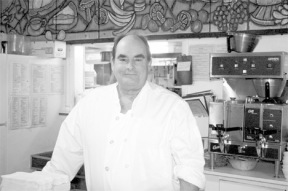The food at Neil’s Clover Patch in Bayview just got better. The taste is the same, but diners can enjoy their meal with less guilt.
Owner Neil Colburn switched all oil products to trans fat-free alternatives such as canola oil. That cuts down on cholesterol, saturated fats and trans fats. The Clover Patch’s burgers are now made with lean 100-percent ground chuck, cutting down the fat content by nearly 50 percent, Colburn said.
It’s a big step for a restaurant known for its home-cooked, often deep-fried American favorites.
“Essentially it’s about getting as much fat out of our diet as we can,” Colburn said.
Changes at the Clover Patch follow a national trend by the food industry to offer diners more healthy alternatives.
In early December, New York City banned the use of artificial trans fats in all 24,000 restaurants in the city. Government officials from Boston to Los Angeles are considering similar bans. And a number of national restaurants and chains such as Seattle’s Starbucks Coffee are grabbing headlines for giving trans fats the boot.
“If KFC and New York City can do it, I can do it,” Colburn said.
After New York approved a ban on trans fats in restaurants and school cafeterias, legislators in California, Connecticut, Florida and Massachusetts followed suit with proposals for full or partial statewide bans.
The surge grew stronger in January with additional calls for prohibiting trans fats, also known as partially hydrogenated oils, by state legislators in Maryland, Mississippi, New Hampshire, New Jersey, New York, Rhode Island, Texas and Virginia.
Here in Washington, health officials have commended New York for its efforts, but have also said it will take months of studies and discussion before a similar proposal could be considered in Olympia.
While it is common knowledge that fat is not good for the body, fried foods, butter and oil are part of the culinary culture of the United States.
“It’s part of the American diet,” Colburn said. “Fat makes it taste better.”
Now, the Clover Patch team is trying to make American favorites ranging from eggs and bacon in the morning to chicken fried steak for dinner better for the customers, he added.
Artificial trans fats were introduced in the early 1900s and are made by adding hydrogen to vegetable oil to make it stable. This process gives foods the desirable taste, shape and texture that restaurants say is challenging to replicate with trans-fat-free recipes.
Colburn said he disagrees. Not a single customer has noticed the switch.
In fact, Colburn may be the toughest critic on taste. One of the few items on the menu that is still made with trans fat is his signature salad dressing.
“I am looking for a mayo that’s trans fat-free and tastes really good,” he said. “It’s a work in progress.”
At home, you can find trans fats in many crackers, cookies, margarines and shortenings. Recently, many potato chip manufacturers have started to fry their crisps in canola or sunflower oil.
It isn’t a simple switch for businesses, however, considering how much oil is used at a place like the Clover Patch.
Colburn and his team go through about 200 pounds of oil a week for the kitchen’s deep fryer alone, he said.
Most Americans consume about 4.7 pounds of trans fats per year, according to the U.S. Food and Drug Administration. The American Heart Association recommends eating less than 1.6 pounds per year based on the average 2,000 calorie-per-day diet.
Experts claim elimination of trans fats would reduce coronary heart disease by 19 percent, according to the New England Journal of Medicine.
The switch doesn’t come cheap either, Colburn said. The trans fat-free products are about one third more expensive, but Neil’s Clover Patch has been known for more than two decades for its menu of casual, affordable food.
“It’s hard to find a place on the island to eat under 10 bucks,” Colburn said. “We want to keep it that way.”
Michaela Marx Wheatley can be reached at 221-5300 or mmarxwheatley@southwhidbeyrecord.com.



